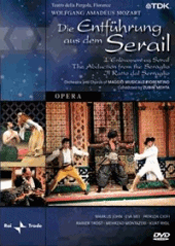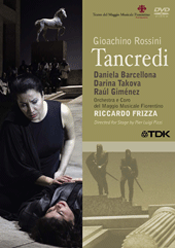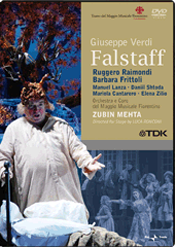Recently in Recordings
The Sixteen continues its exploration of Henry Purcell’s Welcome Songs for Charles II. As with Robert King’s pioneering Purcell series begun over thirty years ago for Hyperion, Harry Christophers is recording two Welcome Songs per disc.
In February this year, Albanian soprano Ermonela Jaho made a highly lauded debut recital at Wigmore Hall - a concert which both celebrated Opera Rara’s 50th anniversary and honoured the career of the Italian soprano Rosina Storchio (1872-1945), the star of verismo who created the title roles in Leoncavallo’s La bohème and Zazà, Mascagni’s Lodoletta and Puccini’s Madama Butterfly.
Collapsology. Or, perhaps we should use the French word ‘Collapsologie’ because this is a transdisciplinary idea pretty much advocated by a series of French theorists - and apparently, mostly French theorists. It in essence focuses on the imminent collapse of modern society and all its layers - a series of escalating crises on a global scale: environmental, economic, geopolitical, governmental; the list is extensive.
Amongst an avalanche of new Mahler recordings appearing at the moment (Das Lied von der Erde seems to be the most favoured, with three) this 1991 Mahler Second from the 2nd Kassel MahlerFest is one of the more interesting releases.
If there is one myth, it seems believed by some people today, that probably needs shattering it is that post-war recordings or performances of Wagner operas were always of exceptional quality. This 1949 Hamburg Tristan und Isolde is one of those recordings - though quite who is to blame for its many problems takes quite some unearthing.
The voices of six women composers are celebrated by baritone Jeremy Huw Williams and soprano Yunah Lee on this characteristically ambitious and valuable release by Lontano Records Ltd (Lorelt).
As Paul Spicer, conductor of the Royal Birmingham Conservatoire Chamber Choir, observes, the worship of the Blessed Virgin Mary is as ‘old as Christianity itself’, and programmes devoted to settings of texts which venerate the Virgin Mary are commonplace.
Ethel Smyth’s last large-scale work, written in 1930 by the then 72-year-old composer who was increasingly afflicted and depressed by her worsening deafness, was The Prison – a ‘symphony’ for soprano and bass-baritone soloists, chorus and orchestra.
‘Hamilton Harty is Irish to the core, but he is not a musical nationalist.’
‘After silence, that which comes closest to expressing the inexpressible is music.’ Aldous Huxley’s words have inspired VOCES8’s new disc, After Silence, a ‘double album in four chapters’ which marks the ensemble’s 15th anniversary.
A song-cycle is a narrative, a journey, not necessarily literal or linear, but one which carries performer and listener through time and across an emotional terrain. Through complement and contrast, poetry and music crystallise diverse sentiments and somehow cohere variability into an aesthetic unity.
One of the nicest things about being lucky enough to enjoy opera, music and theatre, week in week out, in London’s fringe theatres, music conservatoires, and international concert halls and opera houses, is the opportunity to encounter striking performances by young talented musicians and then watch with pleasure as they fulfil those sparks of promise.
“It’s forbidden, and where’s the art in that?”
Dublin-born John F. Larchet (1884-1967) might well be described as the father of post-Independence Irish music, given the immense influenced that he had upon Irish musical life during the first half of the 20th century - as a composer, musician, administrator and teacher.
The English Civil War is raging. The daughter of a Puritan aristocrat has fallen in love with the son of a Royalist supporter of the House of Stuart. Will love triumph over political expediency and religious dogma?
Beethoven Symphony no 9 (the Choral Symphony) in D minor, Op. 125, and the Choral Fantasy in C minor, Op. 80 with soloist Kristian Bezuidenhout, Pablo Heras-Casado conducting the Freiburger Barockorchester, new from Harmonia Mundi.
A Louise Brooks look-a-like, in bobbed black wig and floor-sweeping leather trench-coat, cheeks purple-rouged and eyes shadowed in black, Barbara Hannigan issues taut gestures which elicit fire-cracker punch from the Mahler Chamber Orchestra.
‘Signor Piatti in a fantasia on themes from Beatrice di Tenda had also his triumph. Difficulties, declared to be insuperable, were vanquished by him with consummate skill and precision. He certainly is amazing, his tone magnificent, and his style excellent. His resources appear to be inexhaustible; and altogether for variety, it is the greatest specimen of violoncello playing that has been heard in this country.’
Baritone Roderick Williams seems to have been a pretty constant ‘companion’, on my laptop screen and through my stereo speakers, during the past few ‘lock-down’ months.
Melodramas can be a difficult genre for composers. Before Richard Strauss’s Enoch Arden the concept of the melodrama was its compact size – Weber’s Wolf’s Glen scene in Der Freischütz, Georg Benda’s Ariadne auf Naxos and Medea or even Leonore’s grave scene in Beethoven’s Fidelio.
Recordings

14 Sep 2008
Mozart, Rossini and Verdi at the Maggio Musicale Fiorentino
Of these three productions staged for the Maggio Musicale Fiorentino, the beautifully dressed Entführung and refined Tancredi present the company as a theater for tasteful, stylish productions, just a tad on the dull side.
Not the Falstaff. Luca Ronconi's staging moves the action up to 20th century Britain, with the housewives thoroughly middle-class, in costumes suggesting a 1950s' time frame. However, Falstaff's henchmen sport punk hair stylings and accouterments, and the Fat Knight himself is a rouged, bleached sleazebag, just another glass of potted wine away from total dissolution.
Christoph Wagenknecht's handsome sets for Die Entführung aus dem Serail have a kaleidoscope effect, with a mix of ornate Arabic designs adorning screens and lattices. The costumes of Catherine Voeffray have the imagination and detail of the best film costumes. But their work is let down by the pedestrian direction of Eike Gramss. Dialogue scenes stop time, with leaden pauses and perfunctory movement. The key casting of Entführung, oddly enough, is the non-singing role of the pasha Selim. If he does not have the power and charisma needed, the drama falls flat, and though Markus John is not wholly inadequate, his scenes never come to life. Rainer Trost's Belmonte makes for a very bland hero, both as actor and singer. Eva Mei sings wonderfully as Konstanze, her technique more than capable in this very difficult role. But she seems so reserved, or self-possessed, that the drama never engages. Patrizia Ciofi and Mehrzad Montazeri outshine their co-stars as the other couple, and Kurt Rydl hams it up amusingly enough as Osmin. Zubin Mehta gives the star performance here, leading the Florentine forces in a dynamic, exciting reading of this great score.
 Besides directing, Pier Luigi Pizzi designed the sets and costumes for Tancredi. His impeccable taste means that the production pleases the eye, with the off-white marble flooring and columns contrasting well with the red, black, and white spectrum of the costumes. The challenge of staging any dramatic Rossini comes with deciding how seriously to take the largely preposterous goings-on. Pizzi's decorous approach mostly skirts the risible without taking itself too seriously, although one silhouette effect of the hero (a pants role for mezzo) as he enters on a sailboat goes on a bit long and may prompt a giggle or two. An excellent cast delivers the bel canto goods, with Daniella Barcellona physically and artistically imposing in the title role, experienced tenor Raúl Giménez handling expertly the high line of his role, and Darina Takova moving her large voice around fairly nimbly. Riccardo Frizza and the Florentine forces keep the music moving without rushing.
Besides directing, Pier Luigi Pizzi designed the sets and costumes for Tancredi. His impeccable taste means that the production pleases the eye, with the off-white marble flooring and columns contrasting well with the red, black, and white spectrum of the costumes. The challenge of staging any dramatic Rossini comes with deciding how seriously to take the largely preposterous goings-on. Pizzi's decorous approach mostly skirts the risible without taking itself too seriously, although one silhouette effect of the hero (a pants role for mezzo) as he enters on a sailboat goes on a bit long and may prompt a giggle or two. An excellent cast delivers the bel canto goods, with Daniella Barcellona physically and artistically imposing in the title role, experienced tenor Raúl Giménez handling expertly the high line of his role, and Darina Takova moving her large voice around fairly nimbly. Riccardo Frizza and the Florentine forces keep the music moving without rushing.
 The decorous and tasteful don't play a large role in Luca Ronconi's Falstaff, with sets by Margherita Palli and costumes from Carlo Maria Diappi. Some fans of Verdi's autumnal comedy will take offense at the updating (to a time-warp mix of late 20th century UK society, with the housewives in floral jersey dresses of the 1950s and Falstaff's henchmen in the studded leather and dyed Mohawks of the '80s and '90s). Ruggero Raimondi's portrayal will dismay some as well. Instead of the usual tubby charmer who may indulge a bit too much in ale and mead, Raimondi's Falstaff has luridly bleached hair, rouged cheeks, and the bulbous belly of an alcoholic. In other words, this is a Falstaff who truly deserves a comeuppance at the hands of the wives, even if they strut and scheme with a self-confidence that borders on the arrogant.
The decorous and tasteful don't play a large role in Luca Ronconi's Falstaff, with sets by Margherita Palli and costumes from Carlo Maria Diappi. Some fans of Verdi's autumnal comedy will take offense at the updating (to a time-warp mix of late 20th century UK society, with the housewives in floral jersey dresses of the 1950s and Falstaff's henchmen in the studded leather and dyed Mohawks of the '80s and '90s). Ruggero Raimondi's portrayal will dismay some as well. Instead of the usual tubby charmer who may indulge a bit too much in ale and mead, Raimondi's Falstaff has luridly bleached hair, rouged cheeks, and the bulbous belly of an alcoholic. In other words, this is a Falstaff who truly deserves a comeuppance at the hands of the wives, even if they strut and scheme with a self-confidence that borders on the arrogant.
For those open to Ronconi's approach, this Falstaff will succeed in many ways. The set design enables a constant flow of fresh perspectives on the action, with the transformation to the forest in the final act a particular delight. The comedy now has the same edge and sharp pace of Verdi's miraculous score, and with that wonderful veteran Zubin Mehta back in charge, not a delightful moment is wasted. It's Raimondi's show, and he owns every moment, but his supporting cast is right there with him. Barbara Frittoli has never been more beautiful or vocally appealing as Mrs. Ford, and Manual Lanza makes for a properly stuffy and smug husband. Daniil Shtoda and Mariola Cantarero don't wear out their welcome as the lovers, and Elena Zilio's spinsterish Mrs. Quickly, clinging to her handbag, brings a fresh look to the role. Note must be made of the hilarious Gianluca Floris and Luigi Roni as Bardolfo and Pistola.
All three of these DVDs have deserving qualities. However, if the Opera Today reader has a dislike for the more risky stagings, the Falstaff may not be advised, no matter how much it pleased your reviewer. The Mozart and Rossini are safe choices for lovers of those two operas.
Chris Mullins


